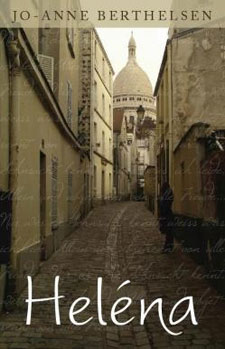Sydney author Jo-Anne Berthelsen's first novel takes us into the life of a young Czechoslovakian pianist just before the beginning of the Second World War and follows her for ten years.
Based on a true story, the book has been carefully researched to recount what life was like for Christians and Jews in that country as Hitler took over their beloved homeland.
 At first the story seems too good to be true, as everything is going so well for Heléna and her family and friends. She is enjoying her music studies, meets and marries Stefan, a successful biscuit factory owner and life seems unreasonably sweet. Berthelsen paints the picture so rosily that you may find it rather slow at first, though here and there you will notice that something sinister is happening. But once the occupation begins, you will be hanging onto your seat, as one by one her closest family and friends are swept up into the horror of the brutality of Hitler's relentless campaign for domination.
At first the story seems too good to be true, as everything is going so well for Heléna and her family and friends. She is enjoying her music studies, meets and marries Stefan, a successful biscuit factory owner and life seems unreasonably sweet. Berthelsen paints the picture so rosily that you may find it rather slow at first, though here and there you will notice that something sinister is happening. But once the occupation begins, you will be hanging onto your seat, as one by one her closest family and friends are swept up into the horror of the brutality of Hitler's relentless campaign for domination.
At times the author puts late twentieth century ideas into the minds and mouths of her characters. Would a conservative evangelical family in the 1940s delay having children for the sake of the wife's career? Would Václav (Heléna's father) really talk about being "proactive" in the underground political movement? Would people, sixty years ago, have thought of an unhappy person as being "depressed?" And would Heléna have been advised in 1948 that Australia had "a rich aboriginal history"?
A few musical references also do not ring true: I can't imagine a cellist whose favourite work is Saint-Saëns' The Swan. Most cellists have played it so often, they would prefer almost anything else from the rich cello repertoire. Heléna would not be rehearsing a Beethoven concerto (which is a work for soloist with orchestra), with no prospect of performing it with anyone else; Bach wrote no études, which were works from a much later time, after the piano became popular.
The book is undoubtedly the most religious I have ever read, including the Bible. In almost every paragraph we are told about Heléna's faith in God. It is strange that she seems to live in a world where all her friends and acquaintances are deeply religious. Did such a period truly exist in Europe before the war? Mrs Berthelsen could make her book appeal to a wider audience by recasting the ways she depicts Heléna's faith. She could do worse than to examine the variety of ways the biblical narrative writers let us know about their protagonists' faith, and God's engineering of their lives. In the book of Ruth, for example, the faith of Naomi, Boaz and Ruth are obvious, though this is sometimes stated explicitly and at other times implied. And the writer of Esther manages to make the Almighty his hero without once even mentioning him!
The book will probably appeal more to women than men, though I think all musicians would enjoy it. Tantalisingly, it comes to an end with Heléna arriving in Australia in early 1949. And on the inside back cover we read that part two of the story All The Days Of My Life will be available in early 2008. I think readers of the book will be looking forward to this with anticipation.





















